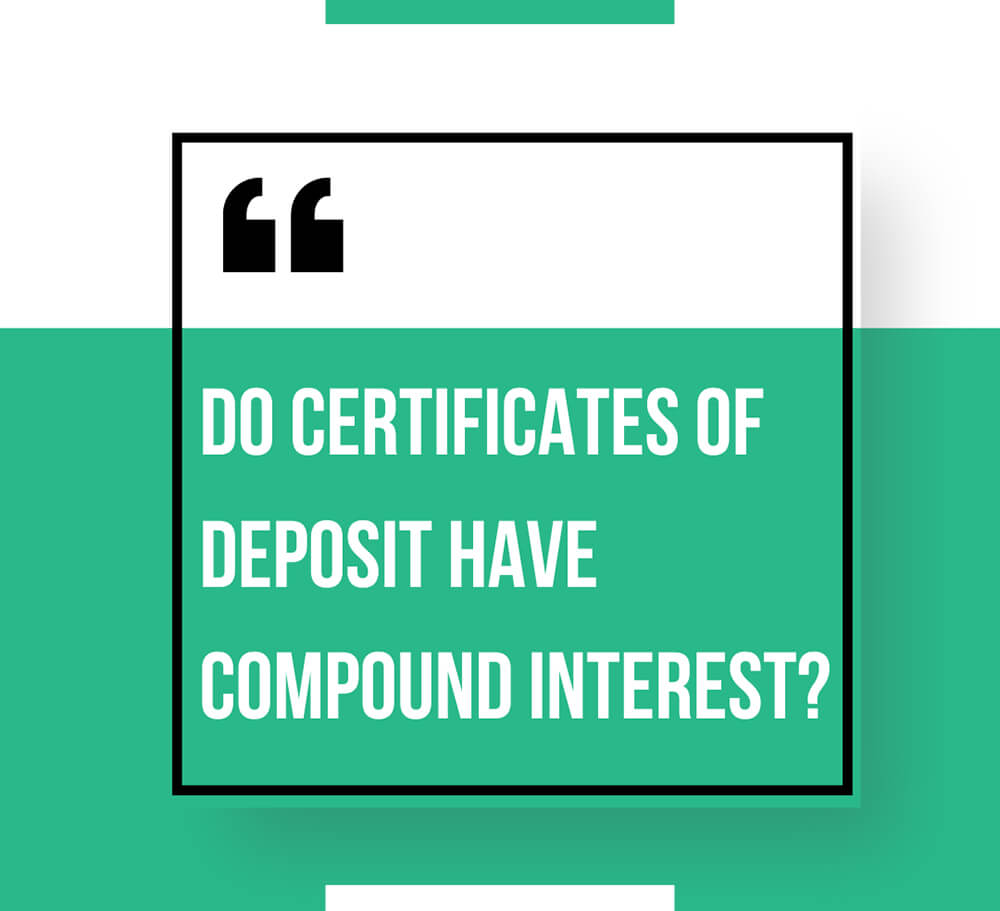Certificates of Deposit (CDs) are a well-known investment type that keeps people’s savings secure and provides an opportunity to earn interest.
One of the biggest attraction factors of certificates of deposit is their varying terms, ranging from just a few months to multiple years, with higher interest rates for longer-term options. During this time, the agreement is that the investor will keep their funds in the CD, and the bank will give them a fixed interest rate.
In this answer, we will explore CDs and answer the question: “Do certificates of deposit have compound interest?”
We will also explore the advantages and disadvantages of investing in CDs and provide readers with a comprehensive understanding of whether CDs align with their financial goals.
Understanding Certificates of Deposit
Certificates of Deposit (CDs) are an investment option allowing individuals to earn interest on their savings. They typically have fixed interest rates that are higher than traditional savings accounts, which makes them appealing to those searching for a higher return.
The term of a CD can range from several months to a few years, during which time the investor agrees to leave their money in the CD. The bank pays out the principal and accumulated interest at the end of the term.
If the investor withdraws their money before the maturity date, they may be subject to penalties and forfeit some of the interest earned.
Certificates of deposit are a popular choice amongst those looking to earn a predictable return on their savings, as they represent a low-risk investment option.
Key Takeaway: Certificates of Deposits (CDs) are a safe form of investment, allowing investors to earn interest on their funds with higher interest rates than traditional savings accounts. They have varying terms, and if the investor withdraws their money before the maturity date, they may be subject to penalties and forfeit some of the interest earned.
Read More: Tips on Investing for Beginners

What is Compound Interest?
Compound interest is a financial concept that includes the interest earned on an investment, which includes not only the initial principal amount but also the previously accumulated interest. This means that the investment’s interest is reinvested to earn more interest and generates exponential growth.
Compounding periods refer to how often the interest is calculated and added to the investment. The higher the compounding periods, the higher the returns will be. For example, if an investment earns 5% per year with annual compounding, the return after ten years is 62.89%. However, if the same investment earned 5% per year with monthly compounding, the return after ten years is 64.08%.
The noteworthy aspect of compound interest is that it enables investors to yield more earnings without infusing extra funds, resulting in the exponential growth of investments over a longer period.
Key Takeaway: Compound interest is a financial concept that enables investors to earn more on their savings by reinvesting the previously earned interest. Compounding periods refer to how often the interest is calculated and added to the investment, with higher compounding rates resulting in higher returns.
Do CDs Offer Compound Interest?
It is commonly believed that CDs do not offer compound interest, but this is actually untrue. Although the interest is typically not paid until the end of the term, it is calculated on a daily basis and added to the initial amount.
This generates compound growth over time as the interest is reinvested. The frequency of compounding periods varies, with some CDs offering daily, monthly, or annual compounding.
The more frequent the compounding, the greater the overall returns will be, highlighting the need to consider this factor when selecting a CD.
In short, CDs are an attractive choice for low-risk, fixed-income investors looking for a reliable return on investment while taking advantage of compound interest.
Key Takeaway: Contrary to popular belief, CDs do indeed offer compound interest. The frequency of compounding periods varies and the more frequent the compounding, the greater the overall returns will be. Investing in CDs is a great option for low-risk, fixed-income investors looking for a reliable return on investment while taking advantage of compound interest.

Factors Affecting Compounding on CDs
Various factors, such as the interest rate, compounding frequency, and length of the term, can have an impact on the compounding of interest when it comes to CDs.
CDs with longer terms tend to offer higher interest rates, which can result in a greater return overall owing to the power of compound interest.
As highlighted early, the frequency of compounding is also an important factor to consider since a greater frequency of compounding periods can lead to greater returns. This can be exemplified by a CD that compounds daily, which will earn more than one that compounds annually.
Furthermore, some CDs propose a “step-up” feature, where the interest rate grows over time, resulting in even more significant returns.
By taking these factors into account, investors can choose a CD with an optimal interest rate and compounding frequency that aligns with their financial goals.
Key Takeaway: Various factors, such as the interest rate, compounding frequency, and length of the term, can have an impact on how quickly a CD’s compound interest grows. Longer terms tend to offer higher interest rates, and more frequent compounding periods lead to greater returns. Additionally, some CDs propose a “step-up” feature where the interest rate grows over time for even larger returns.
Comparing CDs with Other Investment Options
Investors have many investment options to choose from, including savings accounts, money market accounts, and bonds. However, CDs that offer compound interest provide certain advantages over these options.
One of the advantages of CDs is that they offer higher interest rates, making them more favorable for earning a high return on investment.
Additionally, CDs offer investors fixed interest rates, which means that they can predict their earnings with greater precision.
However, CDs also come with their own set of disadvantages.
First of all, they are less liquid than other accounts, and investors may have to leave their funds locked for a set period of time. Also, early withdrawal penalties may reduce returns, and CDs may not offer the same growth potential as stocks.
All in all, CDs can be a suitable option for those looking for low-risk investments with compound interest. Before choosing this option, investors should carefully consider their financial goals and risk tolerance.
Key Takeaway: Certificates of Deposit (CDs) offer investors higher interest rates, fixed returns, and a low-risk option for earning compound interest. However, they are less liquid than other accounts and feature early withdrawal penalties, which could reduce returns. Investors should carefully consider their financial goals before choosing a CD account as an investment option.

Strategies for Maximizing Returns on CDs
Numerous methods exist for enhancing returns on CDs. One such approach is selecting extended terms to obtain better interest rates.
Long-term CDs usually offer more significant interest rates, thereby increasing potential returns. Yet, weighing the elevated returns against the investment’s liquidity is crucial since more extended CDs may be less liquid.
Another method is to select higher interest rates, which certain credit unions/banks offer on long-term CDs or sizable deposits. To compare rates best, evaluating the ones of a range of institutions is vital. Investors may also want to consider “jumbo” CDs that come with higher interest rates but require more extensive deposits.
A CD ladder is another strategy to maximize returns, involving investing in several CDs with varying terms. Upon maturity, it’s possible to reinvest funds into a longer-term CD with a higher interest rate.
Key Takeaway: Various strategies exist for enhancing returns on CDs. Some include selecting extended terms to obtain better interest rates, comparing banks/credit unions for higher interest rates, and investing in a CD ladder involving several CDs with varying terms. All of these can be helpful tools for maximizing the returns of certificates of deposit.
Read More: Saving Money for a Goal
Tax Implications of Compound Interest on CDs
The interest income on CDs is subject to an individual’s marginal tax rate, dependent upon their income level.
If sold before maturity for a profit, CDs are also subject to capital gains taxes.
In order to plan for tax liabilities, assess your tax bracket and the impact of investment income on your overall tax liability.
Investing in CDs within a tax-advantaged account, such as an IRA or 401(k), can defer taxes until funds are withdrawn. Tax-loss harvesting may also be used for offsetting gains from CDs with losses from other investments.
Be wise about minimizing tax liabilities by carefully considering the tax implications of CD investments, and consulting a financial advisor or tax professional can assist in developing a tax-efficient investment strategy.
Key Takeaway: Interest income on CDs is subject to an individual’s marginal tax rate, dependent upon their income level. If sold before maturity for a profit, CDs are also subject to capital gains taxes. Tax-advantaged accounts and tax-loss harvesting can be used for offsetting gains from CDs with losses from other investments. It is important to consider the tax implications of CD investments when evaluating returns and developing a strategy that minimizes liability.





